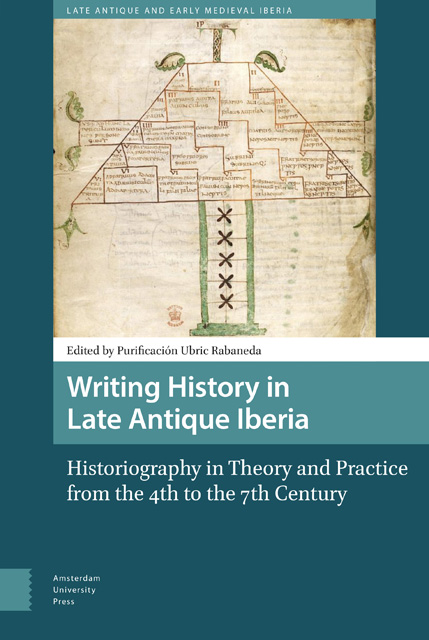 Writing History in Late Antique Iberia
Writing History in Late Antique Iberia Book contents
- Frontmatter
- Table of Contents
- 1 Writing History in Late Antique Iberia: Theory and Praxis
- 2 Para qué sirve la Historia : Principios teóricos de la historiografía hispana tardoantigua
- 3 From Christian Historiography to the Emergence of National Histories : Spanish Historiography between Romans and Visigoths
- 4 Orosius: An Iberian Patriot’s History of Rome
- 5 Orosius, Barbarians, and the Christian Success Story
- 6 Prophecies and Omens of the Fall of the Roman Empire in the Chronicle of Hydatius of Lemica
- 7 La dimensión política de los historiadores del reino visigodo de Toledo
- 8 The Definitions and Uses of Historia in Isidore of Seville
- 9 Bishops and Their Biographers : The Praxis of History Writing in Visigothic Iberia
- 10 Local Powers and Construction of the Past in the Visigothic Kingdom of Hispania
- 11 The Contemplation of the Past in the Libellus Precum of Faustinus (and Marcellinus)
- 12 Orthodoxy and Heterodoxy : The Historiography of Hispania in Late Antiquity
- 13 Expulsados de la Historia : El argumento histórico en la polémica antijudía hispana (siglos IV-VII)
- 14 Consideraciones sobre la temporalidad en las Vitae Sanctorum visigóticas
- 15 The Image of Leovigild as Arian Monarch in the ‘Vitas Patrum Emeritensium’ : From Historical Reality to Hagiographical Deformation
- Index
9 - Bishops and Their Biographers : The Praxis of History Writing in Visigothic Iberia
Published online by Cambridge University Press: 18 April 2023
- Frontmatter
- Table of Contents
- 1 Writing History in Late Antique Iberia: Theory and Praxis
- 2 Para qué sirve la Historia : Principios teóricos de la historiografía hispana tardoantigua
- 3 From Christian Historiography to the Emergence of National Histories : Spanish Historiography between Romans and Visigoths
- 4 Orosius: An Iberian Patriot’s History of Rome
- 5 Orosius, Barbarians, and the Christian Success Story
- 6 Prophecies and Omens of the Fall of the Roman Empire in the Chronicle of Hydatius of Lemica
- 7 La dimensión política de los historiadores del reino visigodo de Toledo
- 8 The Definitions and Uses of Historia in Isidore of Seville
- 9 Bishops and Their Biographers : The Praxis of History Writing in Visigothic Iberia
- 10 Local Powers and Construction of the Past in the Visigothic Kingdom of Hispania
- 11 The Contemplation of the Past in the Libellus Precum of Faustinus (and Marcellinus)
- 12 Orthodoxy and Heterodoxy : The Historiography of Hispania in Late Antiquity
- 13 Expulsados de la Historia : El argumento histórico en la polémica antijudía hispana (siglos IV-VII)
- 14 Consideraciones sobre la temporalidad en las Vitae Sanctorum visigóticas
- 15 The Image of Leovigild as Arian Monarch in the ‘Vitas Patrum Emeritensium’ : From Historical Reality to Hagiographical Deformation
- Index
Summary
Abstract
Historiography in Visigothic Iberia was intimately interconnected with episcopal power. This chapter explores the central role that bishops played in the historiography of the period, both as authors and as subjects within the histories. The centrality of bishops to the historiography of the period is further illustrated by consideration of what historians failed to pass on (or treated very briefly), from the local disputes in which they engaged in their bishoprics to the moments that they became involved in disputes with the monarchy or with other bishops. In general, the purely historiographical writings obscure historical instances of disputation over episcopal office at the local level, except in a few limited cases where the aim was to establish the righteousness of the Nicene position.
Keywords: bishops, Isidore of Seville, biography, hagiography, chronicles
Introduction
Some of the historians of Visigothic Iberia had a well-developed appreciation of the boundaries of the historiographical genres within which they were writing and may even have had their own philosophies of history. Isidore of Seville’s theoretical writings on history, for instance, clearly had some influence on his practice as an historian. Yet, it is necessary to extend our analysis beyond purely theoretical matters if we are to understand better how and why Isidore and his peers in sixth- and seventh-century Hispania wrote about the past. If they wanted to see how others had written about the past and what they had written, Visigothic-era writers also had access to a wide range of historiographical sources, produced within the Iberian Peninsula and beyond, in addition to the theoretical works of Isidore and his predecessors. The historical productions of the period cannot easily be separated from the immediate historical contexts in which they were written either. John of Biclarum wrote his Chronicle to celebrate the conversion of the Goths to Nicene Christianity at the Third Council of Toledo in 589. Isidore of Seville rewrote his Chronicle and Histories in the aftermath of the expulsion of the Byzantines from Hispania in the mid-620s. Julian of Toledo composed the History of King Wamba to record Wamba’s triumph over the rebel Paul in the mid-670s.
- Type
- Chapter
- Information
- Writing History in Late Antique IberiaHistoriography in Theory and Practice from the 4th to the 7th Century, pp. 155 - 180Publisher: Amsterdam University PressPrint publication year: 2022
